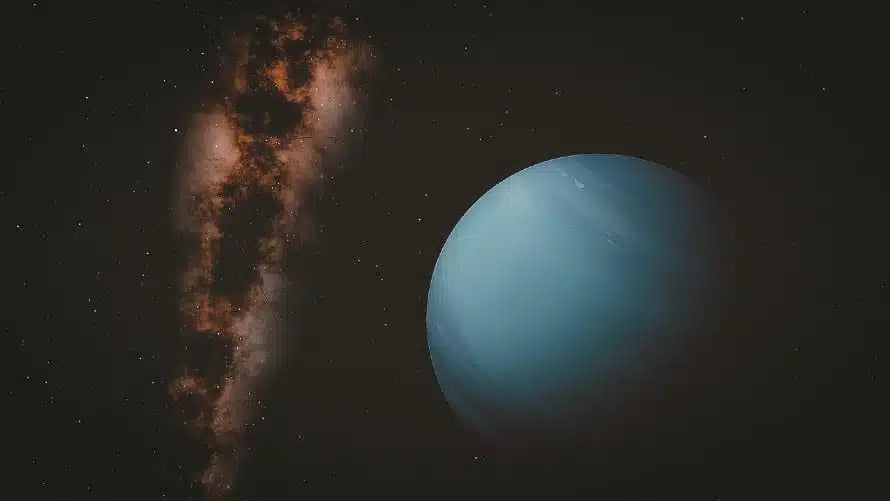
The Planets: The Role of Neptune in Astrology
Share
Neptune, the blue planet
Neptune is the fourth largest planet in the solar system, with a mass 17 times greater than Earth. Its name is derived from the Roman god of the sea, and its symbol, still used today, is nothing more than a stylization of Neptune's trident.
This planet's composition is quite unique, similar to that of Uranus, but different from the gas planets like Saturn and Jupiter. Neptune and Uranus are often called the "ice giants." The planet has 14 known natural satellites, the most famous of which is undoubtedly Triton.
Neptune in mythology and astrology
The discovery of Neptune was made through Uranus: in fact, astrophysicists, observing the latter's orbit, intuited that there must be another planet somewhere altering its trajectory. Through precise calculations, they were able to establish that the influence of Saturn and Jupiter was not sufficient to explain Uranus's eccentric orbit: there was another planet exerting a gravitational pull.
For a long time, Neptune and Uranus were considered twin planets, given that they appeared similar in size. In reality, Neptune is slightly larger, denser, and blue instead of green like Uranus. Interestingly, Neptune was discovered by observing Uranus, as we've said, and in astrology, the key words associated with Neptune are precisely intuition and foresight.
Its action is accomplished with the complicity of Uranus: Neptune transfigures what Uranus brings to light, destroying everything connected to the past. Neptune is essentially a sort of magic wand that takes what is transformed by Uranus' energy and recomposes it into another horizon.
From a symbolic perspective, Neptune is particularly rich in meaning and is not so simple to reduce to a few concepts. Astrologically, it is associated with creativity, intuition, spirituality, but also with escapism and deception. In reality, these key words are not contradictory, but rather define different levels of a certain energy.
This planet is linked to water, understood as a symbol of the unconscious and capable of providing a magnified perception of everything, just like any object immersed in it. It is no coincidence that Neptune, the god of the sea, is the only one with access to the depths of the waters. The magnifying glass function of water is very interesting from a symbolic perspective precisely because it is an optical illusion that brings us back to the planet's key words in astrology and the characteristics of the god of the sea, who was also the god of metamorphosis: every time he emerged from the waters, he took on a different appearance.
This then explains the connection with the unconscious and, by extension, with the psychic depths: in this territory everything is invisible, deceptive, double, deformed.
In the Greek version, Neptune was Poseidon, who symbolized the dark and dangerous forces of nature: he could generate monstrous creatures and, like many gods, had a highly emotional, irascible, and vengeful nature. Interestingly, Poseidon was conceived as the husband of Earth, and was in fact also considered the god of earthquakes.
Going fully into the astrological question, Neptune, based on its position in the signs and houses, and obviously in its aspects, speaks to us of the degrees of illusion, naivety, deception, the nuances that cloud our vision, what prevents us from being who we are. Neptune is in some ways the innermost layer of the personality, it deals with the most subtle human side, the one that is in direct contact with the part that goes beyond the human state and which often attempts to express through the artistic side. It is no coincidence that Neptune is considered, by the most expert esotericists, as the higher octave of Venus . This is said in musical terms, not by chance, and refers to a higher vibration. But it also represents a sort of dark side, a gestation far from the light, a vibration that may seem darker on the outside but leads farther.
Artists are a splendid metaphor for this "movement": they often need to sink into the abyss, to enter into total introversion, isolation, and shadow, in order to tap into the purest and most crystalline creativity. Neptune represents this process and, in fact, gives people a sensitivity to all that is not visible.
The planet Neptune in the birth chart
As we've extensively emphasized, Neptune represents illusion, but also metamorphosis, transcendence, and all actions that can be considered illusory. It's therefore necessary to pay close attention to this planet from an astrological perspective, as it speaks to us of the tendency to detach ourselves from reality and transcend boundaries. This can lead to impaired judgment, resulting in a confused and alienating vision.
People who are particularly influenced by Neptune tend to make poor decisions because they're misled by their own vision, thus developing errors, poor choices, and anxiety. On the other hand, Neptune is connected to creativity, fantasy, and imagination, and if a person is strongly influenced by this planet, they will likely excel in the artistic field.
Neptune, in the birth chart, cannot be considered a representation of physical persons, but rather a potential inherent in each of us. We could consider it figuratively as a gateway between the invisible and the visible, a point of connection that opens us to higher spheres of consciousness.
If Neptune isn't functioning properly in the overall astrological picture, it could lead to detachments from reality, resulting in personalities incapable of assuming responsibilities in everyday life and difficulty managing material life. Many people who develop addictions, and therefore seek out real escapes from reality, have Neptune operating negatively.
By looking at the house in which this planet is located in the birth chart, it is possible to get an idea of what one wants to be in, what one probably comes from or where one would like to go, or even what one would like to dissolve into.
See also the meaning of others Planets in Astrology
